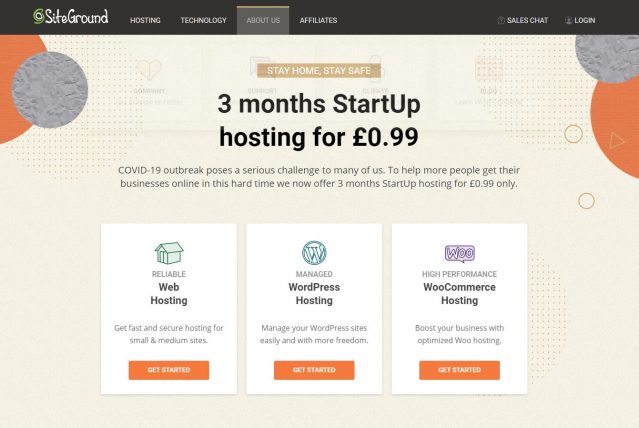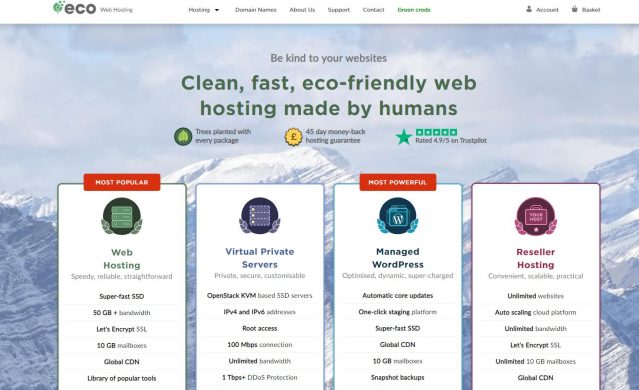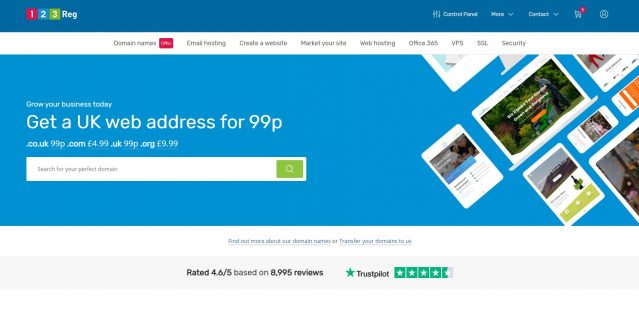Best UK Web Hosting 2023 Reviewed ⭐
Because not every UK web host is created equal!
Because not every UK web host is created equal!
Should you host your website with a long established UK web hosting brand such as 123-reg and Fasthosts or choose one the newer kids on the block like 20i and Krystal?
Does your choice of web host really matter?
✔️ Yes it does. A lot!
Support, reliability, speed and security (not to mention value for money) all vary wildly between UK web hosts.
So how do you make sure you choose the best UK web hosting company? With help from other people’s real experiences!
This isn’t just another web hosting review site. We have taken the ratings from the leading and most credible review sites to create a score you can trust.
Each web host we review is given two scores.
Keep reading to see the best UK web hosting firms available right now...
Below is our list of the top 5 best UK website hosting providers, based on their HostScore and our user reviews. Alternatively, have a look at all the hosts we’ve reviewed or leave your own review.
👩💻 Make sure you choose the right web host for your website >> View all web hosts
Disclosure: Your support helps keep the site running! We earn commission for some of the services we link to on this page. Read More..

20i are a relative newcomer to the world of hosting, but they are backed by the two founders of 123-reg, Webfusion and more recently Heart Internet.
Agree or disagree? Leave your review
20i Pros
+ Advanced hosting platform
+ Best reseller hosting platform
+ 99.99% uptime guarantee
20i Cons
- No money back guarantee on VPS
- That's about it for cons!
20i's recent investment in software and hardware means their platform is using the most up to date stack available.
It also means their server contention rate (the number of websites you are sharing a server with) is going to be small – that’s a good thing.
20i are totally text based support, and do not offer any support over the phone. For me, this makes total sense; live chat and ticket based support are easier to explain technical issues. All their support team are based in the UK.
>>> Visit 20i hosting to get started or go to our 20i review page

Krystal claims to be the largest independent web host in the UK with over 27,000 active clients and more 195,000 websites hosted, and is rated the best web hosting company by many popular review sites, a fact reflected by their high HostScore rating.
Agree or disagree? Leave your review
Krystal Pros
+ 24x7 UK based support
+ 60-day no-fuss money-back guarantee
+ 99.99% uptime guarantee
Krystal Cons
- Domain names not included with shared hosting
- Basic packages a bit pricey for specifications
- Advertised prices don't include VAT
Krystal was founded in 2002 by Simon Blackler after his frustration with the inability to find an “Honest, Reliable & Personal” alternative to the common large hosting corporations that dominated the UK market.
With their 60-day money-back guarantee, Krystal offers twice the risk-free offer compared to the typical 30-day guarantee of other hosting providers.
>>> Visit Krystal hosting to get started or go to our Krystal review page

SiteGround were founded in 2004, and the Bulgarian based web host has exploded on to the scene. The company currently manages over 2 million domain names across multiple territories.
Agree or disagree? Leave your review
SiteGround Pros
+ Advanced hosting platform
+ Free SSL and CDN
+ 99.99% uptime guarantee
SiteGround Cons
- Prices go up a lot after first year
- Expensive domain names
- Setup fee for monthly billing
SiteGround have not gone down the path of bolting on a ton of supplementary products like Office 365 or marketing services, focusing their efforts on providing hosting technology and platforms to power your websites.
It is worth noting that SiteGround are one of the few hosting companies that haven't been hoovered up in the great industry consolidation of the past few years.
SiteGround were one of the earliest pioneers of WordPress specific hosting packages, an their first-mover status shows with the breadth and depth of WordPress-based features on offer.
SiteGround offers all customers a 99.99% monthly uptime guarantee. This works out at guaranteeing no more than just over 4 minutes of downtime per month and just under an hour per year.
>>> Visit SiteGround to get started or go to our SiteGround review page

Eco Web Hosting was founded in 2007 with a unique angle in the hosting world; planting trees for every hosting plan sold to offset the server’s carbon emissions. At the time of writing Eco Web Hosting have planted over 2,200 trees, offset more than 80 tonnes of carbon and sponsored 5 gold standard projects.
Agree or disagree? Leave your review
Eco Web Hosting Pros
+ UK based support
+ Fast hosting platform
+ 45 day money back guarantee
Eco Web Hosting Cons
- No uptime guarantee
- Pricey VPS if you don't need cPanel
- Top tier WordPress hosting plan is expensive
Eco Web Hosting are focused on hosting (no funky extras like SEO or Email marketing). Their services include:
The company is run by an experienced crew, with the large majority having worked for Heart Internet during its peak a few years ago.
>>> Visit Eco Web Hosting to get started or go to our Eco Web Hosting review page

123 Reg have been around since 2000, which in internet years is forever. Currently owned by US hosting giants GoDaddy, 123 Reg’s marketing is primarily focused on home office and small office businesses, but there’s nothing to stop you using them to host your personal WordPress blog.
Agree or disagree? Leave your review
123 Reg Pros
+ UK based support
+ Wide range of hosting related services
+ Regular price discounts for new customers
123 Reg Cons
- Add products to your basket without permission
- Very outdated control panel
- History of technical issues
123 Reg are one of the UK's largest domain name registrars, with over 3.5 million domains registered and 1 millions websites hosting throughout its lifetime.
123 Reg want to be your one-stop shop for anything related to your website, offering a wide range of related services.
123 Reg run a lot of price promotions to attract new customers, such as 99p domain names.
>>> Visit 123 Reg to get started or go to our 123 Reg review page
Web hosting is not a commodity like gas or water. Choosing your web host is an important decision and can have a huge impact on your website and business.
The key areas to judge a web host on are:
All our web hosting reviews have been manually vetted, and are from real people. Each web host has been ranked based purely on users’ reviews and ratings.
This primarily depends on two main factors;
🎨 If you have no previous experience building websites, I would recommend using a drag and drop website builder, or a shared hosting package with WordPress pre-installed.
Is WordPress suitable for a beginner? Yes it is. There is a slightly steeper learning curve than if you use a website builder, but once you become comfortable with the control panel you’ll find it a far more flexible and liberating choice.
Most web host now offer either a dedicated WordPress hosting product or a one-click installation solution as part of their normal hosting.
WordPress can be used to build any type of web host, and it is the CMS that powers this website!
Should I use a website builder like Wix, Squarespace or Shopify? Website builder software has come on leaps and bounds over the years and it is possible to create a great looking and unique website through services such as these.
They are rarely as quick and easy to use as the make out, especially if you want to apply any level of customisation.
However, they do empower beginners with the ability to create a website. As with anything, not all of these suppliers are of the same quality and there are plenty of website builders out there who still offer old fashioned and highly restrictive templates
💻 VPS and dedicated servers are for advanced users who know how to manage a server themselves. Don’t get sucked into getting a low cost VPS simply because you think it is a more powerful version of shared hosting.
Are you unsure what webspace is and why it’s important? What on-Earth is bandwidth? And what the flip is the difference between HDD and SSD?
Here are a selection of the most common web hosting terms you’ll find thrown around by web hosts, along with what they mean and why they are important.
Uptime is the amount of time the server where your website is hosted is online. In an ideal world that would be 100%, but even the likes of Google have server issues, so that is very unlikely.
Most hosts offer an uptime guarantee of at least 99.9%, that works out at just under 1min 30 seconds per day.
Each time a page loads on your computer, the files that make up that page have to be sent over the internet from the server.
The transfer of this data is called bandwidth.
The majority of web hosts now offer unlimited bandwidth, which means they won’t throttle the data passing to and from the host server.
This is how much storage space you have for all your website’s files. When a web host advertises “10GB webspace”, that’s how much storage you have for your scripts, files, images etc.
Most hosting plans start at 10GB. To give that some context, the average WordPress website comes in at around 1GB.
Solid State Drive (SSD) and Hard Disk Drive (HDD) refer to the hardware technology the host’s servers use to store your website files.
An SSD is a lot like a USB stick; the files are stored on a chip with no moving parts. An HDD uses a mechanical arm that reads and writes information onto a spinning storage plate.
An SSD drive can locate data nearly instantly whereas most hard drives have seek times of 10ms or more.
Benchmarks also show that SSDs generally respond to input/output requests up to 20 times faster than a hard drive.
An SSL (Secure Sockets Layer) is a protocol that encrypts visitor data between the server and a website.
Google has been putting a lot of energy behind trying to get more sites to use an SSL certificate, hinting it provides an SEO boost.
Whether it does or doesn’t, they certainly make your site more secure for yourself, and your visitors.
Hosts such as Ionos (formerly 1&1) and 20i offer basic SSL for free.
A lot of web hosts use ‘cloud hosting’ in their marketing material, but what is it?
Unlike traditional hosting, the website files don’t live on a single server. Instead, a network of connected servers host the website, resulting in improvements for availability, flexibility and scalability.
❌ Nope! A common misconception for many people is viewing web hosting as a commodity like gas or water.
The truth is quality differs wildly from company to company.
Your choice of web host will have a direct impact on your website’s uptime and page load speeds.
Customer service is another area where web hosts differentiate themselves.
You’ll sometimes see web hosts claiming to offer shared web hosting packages with unlimited web space, bandwidth/traffic, emails etc.
Obviously nothing can literally be limited, but what they are saying is, they have so many resources that you can’t possible max them out.
Now, for 95% of customers who choose shared web hosting this is true. Problems arise when a website starts to outgrow shared web hosting, or a customer who should use a server takes the ‘unlimited’ claim literally and sees this as a cheaper way of getting the same thing.
If you are a shared web hosting customer with a small to medium sized website, and little in the way of database requirements (e.g. a blog), don’t get put off by an unlimited claim, it really just means you get a lot of resources and you’ll never have to think about using them up.
If you know you should be on a VPS or dedicated server, then I would stick with those products.
You’ll only end up having your website suspended for using too much of a web/database/email server’s resources (crazy, but true).
A little bit, but not so much as to warrant paying a lot for local web hosting if a another country’s web host is cheaper for the same product.
The main benefit is page load speeds because data has less distance to travel from the server to the device. But we are only talking a few microseconds difference.
I personally much prefer a local support team that is on my clock, and has a local cultural understanding of what matters to me.
A lot of web host do not provide SLAs for shared hosting, and will only offer SLAs on servers.
This is because there are thousands of websites on a shared server, each with the potential to affect the server’s performance.
I wouldn’t negatively judge any web host that is not offering an SLA for shared hosting (although I would for servers), but it is definitely a positive for any that do.
Yes there are. Traditionally you would have to choose a Managed Hosting company/product, but these are very, very expensive and really only meant for large businesses/websites.
Thankfully, new products have entered the market to fill this gap, with services such as 1&1’s Performance Hosting and 123 Reg’s Premium Hosting.
These are a mix of VPS/server specifications, but with their own software pre-installed and no root access.
This means they can provide the same level of support as you’d get with shared hosting, with the power of your own server.
cPanel is simply a control panel to manage all aspects of your web hosting, including web space, FTP, email, SSL certificates and more.
Most web hosts either use cPanel straight out of the box or a customised version of it.
A custom built control panel can be as good as, or better than cPanel. The main benefit of choosing a webhost that uses cPanel is how easy it is to transfer between hosts that use it.